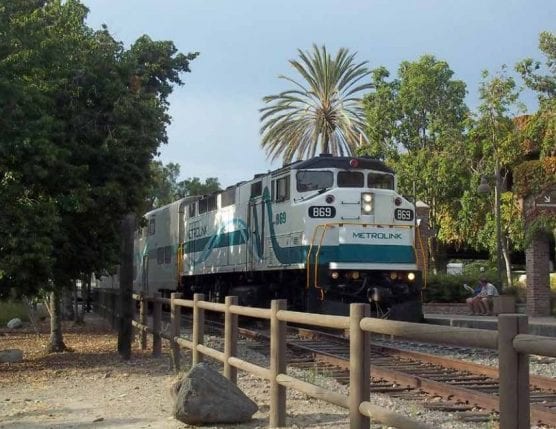Spurred by mass protests demanding an end to racism and police violence in Los Angeles County, officials from the third-largest transportation agency in the nation voted Thursday to probe transit police use of force standards and pursue alternatives to armed officers patrolling buses, trains and platforms.
The move by the L.A. County Metropolitan Transportation Authority Board of Directors begins to disentangle transit policing from the criminal justice system and instead grounds it in a model that shifts resources to health professionals and community members who can support riders in an emergency.
The regional transit agency is about three years into a 5-year contract worth nearly $800 million with multiple police agencies who respond to crisis calls across its network.
Public transportation advocates such as the Alliance for Community Transit L.A. have long demanded Metro acknowledge that armed police have disproportionately handed citations to riders who are predominantly Black and Latino.
A 2017 study by the L.A. Labor/Community Strategy Center found Black people comprised only 19% of rail riders on Metro but made up nearly 50% of riders issued police citations.
“With the COVID-19 outbreak in L.A. County, crime in the region has significantly decreased and riders’ concerns regarding safety are firmly focused on public health interventions: ability to socially distance, sanitation stations and vehicle cleanliness,” ACT LA and other advocates said in a June 22 letter to Metro.
“This further demonstrates that dollars spent on police could be better spent on improving transit reliability and frequency, scaling up social workers and sanitation on transit and at stations, piloting a transit ambassador program, and making transit fare-free.”
Advocates have also called on Metro to make rides on public transportation free in order to avoid having police respond to fare evasion, which could potentially lead to criminalization or other harms for riders.
In response to advocates’ demands, Metro board member and L.A. City Councilman Mike Bonin introduced a motion to develop alternatives to having police respond to nonviolent incidents and health emergencies on public transportation networks.
Metro’s 13-member board approved the motion and established the Transit Public Safety Advisory Committee which will explore having social workers, medical professionals and mediators respond to crisis events in the future.
“Metro needs to be at the forefront of that, and make changes that assure that all of its passengers feel safe,” Bonin said in a statement. “That starts by acknowledging that we cannot rely on an armed police presence for every issue, and we need smarter, more effective solutions.”
The board also approved L.A. County Supervisor Janice Hahn’s motion ordering a 90-day probe into use of force standards adopted by Metro security contractors, the LAPD, the Long Beach Police Department and other law enforcement agencies who respond to emergency calls.
“While law enforcement agencies play an important role in protecting public safety, it is imperative that Metro review the use of force policies that the agencies we contract with and guards we employ follow, in order to protect the lives of the transit riders that they encounter,” the motion states.
Ahead of the board meeting, no member had recommended cutting the regional agency’s overall funding for policing, as has been proposed with budgets for the L.A. Police Department and the L.A. Unified School District.
Board chair and Inglewood Mayor James Butts told the panel he believes police have a vital role in making public transportation safe for riders and that elected officials should adhere to their oversight duties instead of calling for cuts to policing funds.
“We don’t have to change police officers, it’s not the number of officers assigned that’s making a difference in the perception of public safety, we need to change the culture of policing,” said Butts, a former police officer. “There are bad people in the world and that’s why we need police officers.”
Bonin said more than the “culture” of policing must be changed and that seeking better medical emergency training for police misses the point of protesters’ demands.
“There could be better training for police officers but why do that when we could have actual professionals be doing the work,” Bonin said. “It would be less expensive and more effective.”
Butts and incoming Metro board chair and L.A. Mayor Eric Garcetti said in a joint press conference last week the agency is focusing resources on restoring the public’s confidence that riding public transportation is safe during the Covid-19 pandemic.
The agency is facing a nearly $2 billion revenue shortfall stemming from a more than 70% drop in ridership across Metro’s transportation network after stay-at-home orders were issued in March.
— By Martin Macias Jr., CNS
Like this:
Like Loading...
Related





 Tweet This
Tweet This Facebook
Facebook Digg This
Digg This Bookmark
Bookmark Stumble
Stumble RSS
RSS


























REAL NAMES ONLY: All posters must use their real individual or business name. This applies equally to Twitter account holders who use a nickname.
0 Comments
You can be the first one to leave a comment.